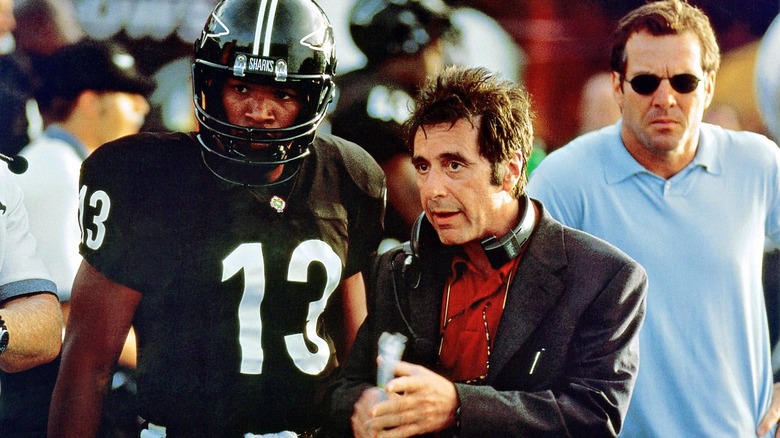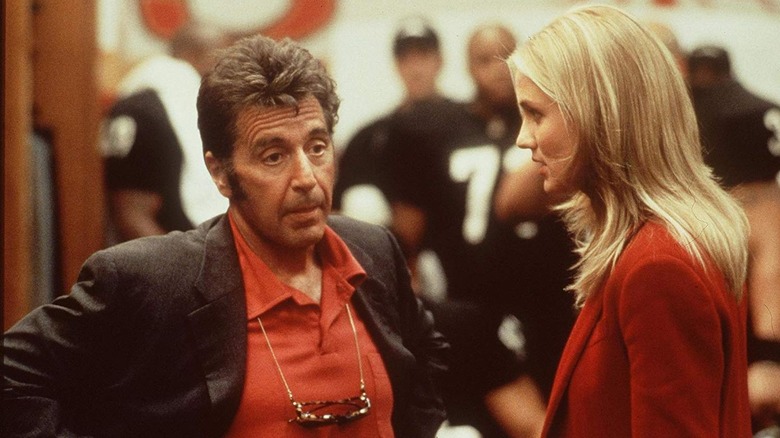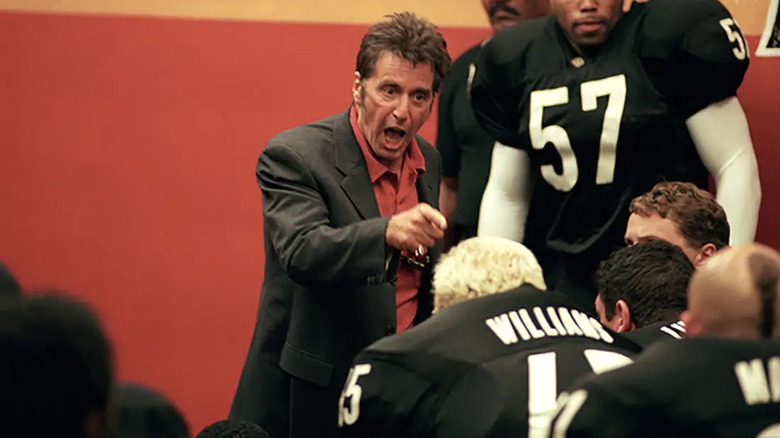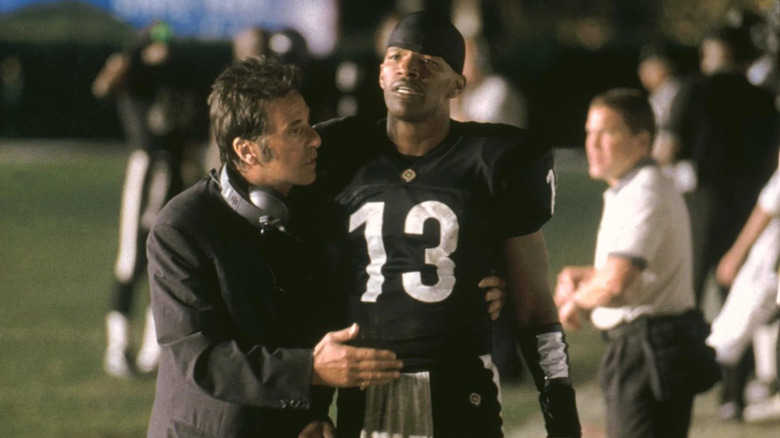The NFL Went To War With Oliver Stone Over The Script For Any Given Sunday
When a topic gets the Oliver Stone treatment, it typically means that it's a controversial subject getting a cinematic deep dive into its origins. He's seemingly left no stone unturned, exploring topics like 1980s greed ("Wall Street"), the Vietnam War ("Born on the Fourth of July" and "Platoon"), the Kennedy assassination ("JFK"), and illegal surveillance ("Snowden").
For two decades, the director had professional football on his radar, dating back to an early 1980s project titled "The Linebacker," which would have starred Charles Bronson. In 1999, Stone's vision of the NFL finally came to fruition with "Any Given Sunday." By then, the game had changed exponentially from the time Charles Bronson was an A-lister in Hollywood. Player side hustles were replaced by multi-million-dollar advertising deals. The allure of "Monday Night Football" was supplanted by around-the-clock coverage on cable and SportsCenter highlights almost on the hour. What did that exposure mean for the modern athlete?
That's the question Stone tried to answer with his unabashed look at the NFL in "Any Given Sunday." Stone's script was the amalgamation of the book "You're Okay, It's Just a Bruise," by a former Oakland Raiders team doctor, and an existing John Logan screenplay based on a struggling coach. But when the National Football League saw the direction of Stone's movie, they went to war with the director to protect their image.
Stone saw the sport going corporate
From 1989 to 1999, eight NFL franchises changed ownership, mostly sold to wealthy millionaires like Robert Kraft (New England Patriots) and Jeffrey Lurie (Philadelphia Eagles). The league was transitioning from family-owned franchises to a corporate structure, and Stone took notice. The director saw a parallel to what was happening in his own industry. He told EW:
"In the '90s, Hollywood was becoming more and more corporate, and so was football; sports just became a giant and almost ridiculously outsized industry. The salaries are enormously inflated and lose meaning for most people. I felt like football is not just about now, there's a tradition; people play for money, but there's something else going on."
It was this corporate culture that Stone took to task in "Any Given Sunday." The film is as relevant today as it was in 1999, with players becoming another cog in the corporate juggernaut known as the NFL. "The players have long been my heroes," he said. "I see them in the same way as the men I've made other movies about: Ron Kovic, Jim Garrison, Richard Nixon," Stone told Premiere Magazine when the film was released. "They were people who went into the public arena and accomplished something but paid a heavy price."
The NFL provoked big changes to the script
The NFL saw Stone's vision of their product and wanted no part of the movie. "Any Given Sunday" is adorned with bombastic characters, memorable speeches, wild parties, substance abuse, and disgusting injuries that include lost eyeballs and ruptured discs, but it also addresses deeper social issues including racism and sexism.
It's as timely as ever in the wake of Patriots owner Robert Kraft narrowly avoiding prostitution charges in 2020 and Commanders owner Daniel Snyder's sexual assault allegations. Then there's the NFL concussion settlement that Vice correctly called "pure evil." Stone was definitely on to something, and we haven't even gotten to fan-related issues that include bloated publicly financed stadiums, price gouging at stadiums, and unfair ticketing practices.
In "Any Given Sunday" the team was originally slated to be the Miami Dolphins, but had to be changed to the Miami Sharks when the league pulled its support. "The NFL was very nasty. They hated the script," Stone said. "They tried to kill the deal by telling players not to be involved."
Fortunately, one renegade owner stepped in to get Stone access to one of the most famous NFL stadiums, helping lend verisimilitude to the extravagant melodrama. It made sense, because it was an owner with a reputation for spitting in the face of league tradition.
'It's like fighting the pentagon'
After being sacked by the league, Stone had to get creative to gain access to film in an actual NFL stadium. Jerry Jones, who purchased the Dallas Cowboys in 1989 and immediately fired beloved longtime head coach Tom Landry, was the sole NFL owner to cooperate.
"We barely got the stadiums. Jerry Jones helped by telling them to f*** off and giving us Texas Stadium. It was a fight all the way," Stone said. "And then when the film came out, the NFL went out of its way to completely blackball us." Stone continued, "There was no coverage from the sports shows. It was not fun to fight them, it's like fighting the Pentagon."
The NFL had a reason to fight Stone. Critics and players alike say there's a lot of realism in the film. "I would say 'Any Given Sunday' is Oliver Stone's fever dream of what the NFL is like," said Will Leitch on SI at the Movies. "And the irony, of course, is that it's actually not that far off from what it is."
Former NFL receiver NFL Greg Jennings agreed. In the same video he said:
"A lot of components in that movie that are just flat-out real. The concept of not playing, guys getting hurt, you being inserted, guys shooting up, doing whatever it takes to stay on the football field, getting the big hit, letting winning and their individual success divide them from the guys in the locker room, it happens!"
As outrageous as "Any Given Sunday" might seem, Stone does a masterful job of exposing serious issues facing NFL players. Rather than cooperate with the respected Oscar-winning director, the NFL played defense and fought Stone at every turn. It's ironic that Stone managed to make "Any Given Sunday" at all, especially with the help of the renegade owner who ushered in the corporate era of the NFL.



